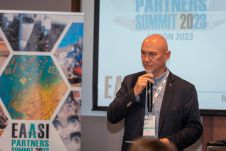Series on Capacity Building 2
FIG’s Building the Capacity
What are the key issues in capacity building facing organisations such as FIG, and how are they handled? What are the capacity-building initiatives currently spearheaded by FIG, and how might these be furthered through global partnerships? FIG president Stig Enemark thoroughly addresses these questions in this, the second article in our current series on Capacity Building.
Capacity development arguably presents a central development challenge, as other social and economic progress depend on it. Given the pivotal role of secure tenure and access to land in underpinning economic development, it is vital that appropriate, sustainable structures are in place at national, organisational, and individual level. This makes capacity building in surveying and land management a key priority for FIG, the premier international organisation representing the interests of surveyors from more than a hundred member countries throughout the world. The aim of FIG is to ensure that the survey disciplines and all who practise them meet the needs of the markets and communities they serve.
Facing Challenges
The term ‘capacity building' that emerged in the 1980s has many meanings and interpretations, depending upon who is using it and in what context. Capacity building as a concept is loosely related to education, training and human-resource development. However, this conventional interpretation has shifted towards a broader and more holistic view covering social, organisational and educational aspects. For the 2007-2010 term of office, FIG has adopted the theme ‘Building the Capacity'. This embraces both ‘flying high' by facing the global agenda in terms of contributing to poverty reduction and meeting the MDGs (see abbreviations), and to ‘keeping our feet on the ground' in contributing to building the capacity for dealing with professional, organisational and technological development at national and local level. This is reflected in the theme of the FIG Congress in Sydney in April 2010: ‘Facing the Challenges - Building the Capacity'.
Three Ways
FIG facilitates capacity development in three ways: professional, institutional and global. With respect to the first, FIG provides a global forum for discussion and exchange of experience and new developments between member countries and professionals. FIG organises annual and regional conferences, and the work of the ten technical committees offers opportunities for member associations and land professionals to participate in the development of all aspects of survey disciplines and practice. In terms of institutional development, FIG supports member countries and regional institutions in developing educational programmes and professional organisations. The former must contain course material reaching at least bachelor level, including the combination of surveying and mapping, spatial information management, and land management. The basic mechanism for professional development includes standards, ethics and a professional code of conduct for serving clients. The third way, involving global development, FIG provides a global forum for institutional development through co-operation with United Nations Agencies such as FAO, UN-Habitat and WB, and sister organisations such as GSDI, IAG, ICA, IHO, and ISPRS (see abbreviations). Such co-operation includes joint projects and joint policy making addressing the above ‘flying high' issues. All development means are, of course, interrelated and interdependent. Professional development at national level requires there being in place both professional organisations and adequate education. Institutional development in terms of mature public agencies and policies requires a solid professional and educational basis for the establishment of a holistic and sustainable approach.
Initiatives
FIG has developed guidelines and publications on capacity building such as:
- Capacity Assessment in Land Administration; a tool for improving LASs through in-country self-assessment of the capacity needs, developed in co-operation with FAO and aimed at developing and countries in transition which have limited financial resources.
- Institutional and Organisational Development; a methodology for assessing and enhancing the institutional and organisational capacity of national survey and mapping agencies and private organisations to perform their key functions effectively, efficiently and sustainably, (developed as a FIG taskforce).
-E-Learning in Professional Surveying Education; FIG Commission 2 (Professional Education) has produced a publication on e-Learning as a key means to enhance the learning process and support knowledge management in surveying education, survey institutions and organisations.
Other publications address standards for Quality Assurance in Surveying Education, Continuing Professional Development, Mutual Recognition of Professional Qualifications, and Ethical Principles and Model Code of Professional Conduct (website 1).
Africa Taskforce
The Network for Young Surveyors provides a vital platform for young surveyors to better engage in the work of FIG through a range of activities, helping bridge the gap between generations and building the capacity to meet future challenges. An Africa Taskforce has been established for 2009-2014 aimed at enabling the survey profession in sub-Saharan Africa to contribute to achieving the MDGs. The focus will be on building the capacity of the survey associations and individual surveyors to contribute to meeting the key challenges of poverty alleviation, economic growth and environmental sustainability, and to act as agents of positive change for the benefit of Africa and its people. Key areas are peri-urban development, environmental resilience, and the involvement of young surveyors and women. The biennial FIG Regional Conferences, most recently held in Costa Rica in November 2007 and Hanoi in October 2009, address capacity-building and other issues high on the regional and local agenda. The focus in Costa Rica was on pro-poor Coastal Zone Management and Building Sustainable LASs, and in Hanoi on Land Acquisition in Emerging Economies, and SDI and the Environment. The key issues, including building capacity, are recapped in a publication (website 1).
Global Partnerships
FIG's strong commitment to the global agenda, as represented by the MDGs and other new challenges such as climate change and disaster-risk management, was confirmed at the FIG-WB conference held in Washington in March 2009. Here two hundred invited experts discussed the importance of Land Governance in implementing the MDGs while responding to new challenges, showing how FIG and WB work in parallel to achieve them. Analysis of the key issues and ways forward are presented in a publication to be launched at the FIG Congress in Sydney in April this year. Together with UN-Habitat, FIG is working on GLTN by focusing on development of pro-poor land-management tools, gender equality, and building capacity for implementing sustainable land policy strategies. Together with FAO, FIG is working on land acquisition and development of Voluntary Guidelines for Responsible Governance of Tenure of Land and Other Natural Resources. Global partnerships exist too within the FIG community itself. A recent focus is on developing a Global Academic Partnership for evolving adequate educational programmes in Land Management in response to the lack of qualified land professionals, a main bottleneck in many developing countries. This partnership relies on the strength of global FIG Academic members and will be further developed by FIG Commission 2.
Abbreviations | |
GLTN | Global Land Tool Network |
GSDI | Global Spatial Data Infrastructure |
FAO | Food and Agriculture Organisation of the United Nations |
FIG | International Federation of Surveyors |
IAG | International Association of Geodesy |
ICA | International Cartographic Association |
IHO | International Health Organisation |
ISPRS | International Society of Photogrammetry and Remote Sensing |
LAS | Land Administration System |
MDGs | Millennium Development Goals |
SDI | Spatial Data Infrastructure |
UN-HABITAT | United Nations Human Settlements Programme |
WB | World Bank |

Value staying current with geomatics?
Stay on the map with our expertly curated newsletters.
We provide educational insights, industry updates, and inspiring stories to help you learn, grow, and reach your full potential in your field. Don't miss out - subscribe today and ensure you're always informed, educated, and inspired.
Choose your newsletter(s)
























